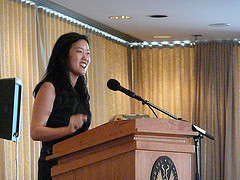Michelle Rhee, a “thank you” and a promise.
A DCentric reader who works for the Georgetown Public Policy Review helpfully sent in a link (thank you!) of an interview that they did with Michelle Rhee yesterday. The questions include, “How do you want your term as DC Chancellor to be remembered?” and “What would you say to education reformers disheartened by your resignation?”. I will admit, I am not familiar with this organization, so to get a sense of what point of view the interview/er was coming from, I surfed around– and didn’t have to go far.
The post which precedes the interview is titled, “Of Hereos (sic) and Villains: A review of the film “Waiting for Superman,” directed by David Guggenheim”. It was penned by the same person who conducted the Rhee interview by email: Padmini Jambulapati. I tripped over the last two sentences of her review:
…in light of Rhee’s resignation, one cannot help but feel that our villains have struck again. But, if the real heroes of Waiting for Superman have taught us anything, it’s that we should continue to hope and aspire for good, in spite of the bad guys.
Our villains? The bad guys? In Jambulapati’s piece, she links the words “our villains” to this Politico article by Ben Smith: “Teachers union helped unseat Fenty“. So the villains are the Teachers Union. Got it. I went back and re-read the interview with that in mind but it felt like it came from a relatively neutral place, despite that review paragraph. This is the portion of the exchange I was most interested in:
Do you think last month’s primary was truly a referendum on education reform, and essentially, you? Can politics and sound policy work successfully together?
Yes, that’s what I understand from the polls I’ve seen, and many residents have said they would have voted for Fenty if he hadn’t closed schools, fired teachers, etc. To me this points even more toward how much courage it takes to make the right decisions for kids, rather than to make the decisions that are politically beneficial. I continue to believe that it’s dangerous for politics to get a say in decisions about children. If they have to, the political concern should be dead last in line about why you’re making a decision that affects kids’ futures.
I don’t know if I’d call all of Rhee’s policies “sound”, but unlike Jambulapati, I didn’t spend three years serving with Teach for America– something Rhee did, as well. To me, a “layperson”, one of the most frustrating aspects about the recent, heated debate over Rhee, DCPS and school reform has been the lack of a neutral perspective.
In fact, for quite some time– even before I started this job– the only two sources I really trusted were Bill Turque at The Washington Post and the person whom I now sit next to in the newsroom here at WAMU, Kavitha Cardoza (if you missed Kavitha’s interview with Rhee, a link to the audio is here– it’s worth a listen, and I’m not just saying that because she is a co-worker). One of the reasons I was so humbled and excited to work at WAMU was because I have listened to it for the entirety of my stay in this city. I trust it to be fair, and that’s why I take my job so seriously, too.
If you’ll bear with me as I slowly learn about our schools as a child-free D.C. resident with no obvious stake in this fight– I did NOT work for Teach for America, nor am I a member of the Union.–I’ll try my hardest to be fair, too. I am so grateful that the readers of this blog care enough to send me links, emails and feedback– thanks again, K– the least I can do is give my best to you.





